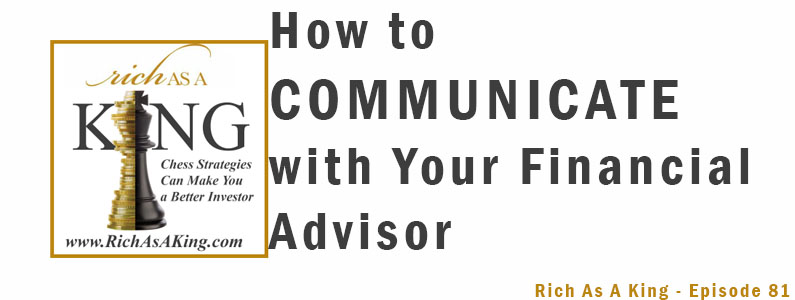
by Douglas Goldstein | Oct 20, 2015 | Behavior finance, Financial Plan, Podcasts |
Communication is vitally important for success in finance, relationships, and other major aspects in life. For tips on how to communicate with your financial advisor and when and with whom you should discuss personal money issues, listen to this instructive financial podcast. To listen to this podcast, click here Or you can download the Rich As A King podcast from your favorite platforms: Itunes, Stitcher, TuneIn, and of course, our website. This podcast is based on Rich As A King: How to Become a Grandmaster of Investing, by Douglas Goldstein, CFP® and Grandmaster Susan Polgar, www.RichAsAKing.com.... Click for more
by Doug Goldstein CFP® | Oct 15, 2015 | Behavior finance |
Internet fraud is growing almost as quickly as the internet itself! As communication technology gets more sophisticated, online thieves and fraudsters are also getting smarter. Whereas spam emails used to be fairly easy to spot with their claims of online wins, today’s scammers frequently use the same logo as your bank and tell you to “click here” to confirm your contact information. Some con artists are even crafty enough to pretend to be officers of the Fraud Squad, giving fake names, details, and a number to call to “prove” they are telling the truth. All you need to do is give them the details of your savings accounts so that they can make sure that no one has stolen your funds (yet!). Three crucial moves for not getting scammed Here are 3 steps you can take to avoid becoming victim to online fraud: Don’t click on any unsolicited links or files that you receive in emails, even if they are from familiar addresses. Open a new browser window and go to the site in your usual way. Banks and financial institutions will never ask you for your password or ID by email. So even if the email looks genuine, don’t respond. Instead, log into your account and see if any messages are waiting for you there. If anything in an email looks suspicious, call the institution to verify that it is really from them. For more information about the dangers of online fraud, click here. ... Click for more
by Doug Goldstein CFP® | Oct 1, 2015 | Behavior finance |
In my twenty-plus years as a financial advisor, I have seen too many investors make the same mistake with their money. What is the all-too-common financial mistake? Investors follow their emotions rather than logic. Sometimes emotions can cause you to make a hasty decision. For example, a compelling ad offering a phenomenally high interest rate on a lucrative-sounding investment may play on your desire to make money quickly and easily. As this is what you want, you may fail to remember the old adage, “If it sounds too good to be true, it probably is.” Feelings of greed and excitement make you rush headlong into a bad investment without stopping to think whether it is really what you need. In a different situation, fear of making a loss or a sentimental attachment to a stock (maybe you inherited it) can hold you back from selling a losing stock or buying a better position. Either way, your emotions are standing in the way of logic, causing you to make some fundamental mistakes. The need to learn There is no “one size fits all” approach to either chess or investing. But looking at the common barriers that cause mistakes, understanding basic concepts, and learning about behavioral finance will help you manage your money more easily because you will recognize many pitfalls that you can avoid. To learn how to avoid other common investing mistakes and to understand why some investors are not successful, read this. Douglas Goldstein, co-author of Rich As A King: How the Wisdom of Chess Can Make You A Grandmaster of Investing, avid chess fan, international investment advisor... Click for more

by Doug Goldstein CFP® | Sep 24, 2015 | Behavior finance, Decision Making |
I love Disney World: fireworks, parades, and Mickey Mouse. A few years ago, we visited there as a family and my wife came home with a unique souvenir: an order for her stockbroker to buy Disney stock. Let’s examine some points my wife considered before buying the Disney stock: Q: Before buying Disney stock, did you check if it would complement the rest of your investment portfolio? A: I knew it was a growth stock, and as a middle-aged investor I’m aware that growth is important to my retirement success. I also know that diversification is important. As I didn’t want to become overly reliant on one particular stock (I generally use money managers who buy ETFs for diversity), I only bought a small position. Q: Before buying the stock, why did you think it would increase in value? A: I had just come back from a Disney vacation and experienced the magic firsthand. This is a company that is all about servicing its clients. In good times as well as in tighter times, families visit Disney. And everyone (except the cranky spoiled toddlers) is always happy. So I thought that over the long term, Disney stock would go up in value. Q: What changes in the economy did you consider before buying the stock? Did you ever feel your money was at risk from investing in this stock? A: No, I felt that Disney was as American as apple pie, and even if it dipped in the short term, the Magic Kingdom would be there when it’s time for me to take my grandchildren to visit. I thought... Click for more

by Doug Goldstein CFP® | Sep 11, 2015 | Behavior finance, Financial Strategies, Strategic Thinking |
Like many manufactured products, today’s increased market volatility can be stamped “Made in China.” Numerous analysts blame current world market volatility on China, because its growth fell below predictions (or should we point our fingers at the analysts for flawed predictions?). China’s weak growth means her factories imported fewer commodities (such as oil and steel) slowing manufacturing output. Lowered demand for manufacturing basics caused commodity prices to fall further, so that every country that relies on selling commodities as part of its GDP was hurt. The ripple effect continues to touch many economies, including America. Many countries suffering from economic problems are close trading partners with the United States. Foreign woes make it difficult for countries like Greece and Russia to maintain their traditional levels of purchasing American exports. Couple this with the strong U.S. dollar, which makes American goods even more expensive for overseas purchasers who are experiencing their own economic doldrums and you can see how foreign economic woes impact the American economy. Unfortunately, there is a downside to a strong dollar. Can you drown in a riptide? In today’s global world, economies are tightly connected, so commotion in one market has only a short path until it reaches other countries. Automatic trading systems and computer programs mean that significant transactions occur without a single human being actively involved (past the programming stages). And when real investors do get involved, consumer confidence and emotions play a huge part in investment decisions. Social media (regardless of their accuracy) spreads fear and uncertainty around the globe with a single tweet or Facebook post. How to save your investments from... Click for more

by Doug Goldstein CFP® | Jul 30, 2015 | Behavior finance |
Warning: Implementing the suggestions in this article requires effort on your part. If you are looking for a get-rich-quick scheme, click here now. If you are committed to improving your financial situation, keep on reading. In order to succeed in building wealth, you not only need to have the patience to be a long-term investor, but you need the endurance to gather the information and the time to interpret the results. All too often, people’s plans fail because they don’t invest the time required to analyze the complete situation. Just like a good chess player wouldn’t move a piece until he examined the entire board, don’t make an investment until you’ve thoroughly studied your circumstances… and that takes time and patience. The trait of patience is perhaps one of the most important skills you can develop on your way to becoming “rich as a king.” Susan Polgar tells a particularly inspiring story of learning patience the hard way: In 1984, I became an “International Master,” which is one step away from the highest ranking in the chess world (Grandmaster). For the following few years, I was the #1 woman player in the world. However, with all of the roadblocks that the Hungarian government put in my way, I never knew when the next opportunity to play in an international competition would arise, but I kept training anyway. Having the patience to work every day, never knowing what the results will be is hard enough, but as a teenager the agony of waiting was emotionally draining, too. I knew that I needed to have patience, not only on the board,... Click for more








